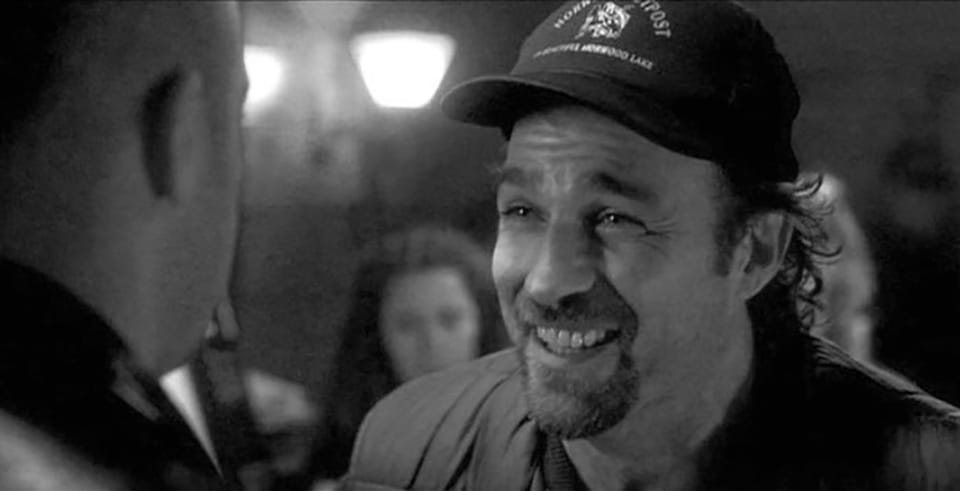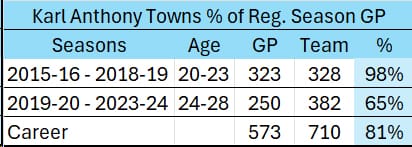A Fascinating Challenge Trade

You likely saw that the New York Knicks and Minnesota Timberwolves have agreed to a significant trade. To say it was unexpected would be an understatement. Even Karl-Anthony Towns himself seems to have not seen it coming. It significantly alters the landscape of the NBA for this season and beyond, and leaves as many questions as it answers for both teams. I've been turning this trade over in my mind for a few days now, and absorbed reactions from those whose opinions I trust. It is a fascinating trade in that there seems to be no real consensus on who won the trade or where it leaves both teams after its completion. I want to look at it from those three angles.
The Trade in a Vacuum
This is a massive win for the Knicks. The final deal is:
- Knicks get: Karl-Anthony Towns, draft rights to James Nnaji
- Timberwolves get: Julius Randle, Donte DiVencenzo, Keita Bates-Diop, protected Detroit Pistons first-round pick (likely to eventually become a second-round pick)
- Hornets get: DaQuan Jeffries, Charlie Brown Jr., Duane Washington Jr., three second-round picks (worst of 2025 DEN/PHI, plus 2026 GS & 2031 NYK)
Being able to upgrade from Julius Randle to Towns is a big deal. Towns may not be a vastly superior player than Randle, but his fit with the Knicks is vastly superior than was Randle's. And I believe the gap in that value when you combine those two factors is more significant than what DiVencenzo brings.
I think it's fair to even wonder if Randle ever suits up for them. I have seen a lot of people defend the merits of this deal from a basketball standpoint, but to me, this is pretty clearly a salary dump on Minnesota's part. I think they could have received a better package at the trade deadline in exchange for parting with Towns now, and the solid footing Minnesota seemed to be on at the end of the postseason is once again shaky. The trade doesn't address Minnesota's two biggest needs – to find a long-term solution at point guard, and to recoup some of their draft pick losses from the Rudy Gobert trade. If you posit that Minnesota is still a team that won't be big spenders, the main way they can keep improving is through the draft. Yet they won't have a first-round pick in at least four of the next seven drafts. At that point, Anthony Edwards will be 30. These next seven years are crucial, this is the best window of opportunity for Minnesota to win a title since they had Kevin Garnett, and possibly ever. An ideal trade of Towns would have brought back more draft capital.
Minnesota also did nothing to address the fact that their point guard, Mike Conley, turns 37 years old in a couple of weeks, and was hurt enough in the second round of last year's playoffs that he had to sit out the critical Game 5 in Denver (which Minnesota lost). The Celtics finally succeeded last year in part because they built enough depth that they could be conservative with Al Horford's minutes. The Wolves have not achieved this depth for Conley.
Having said that, Randle and DiVencenzo still have tons of value. They also have been able to constantly reinvent themselves throughout their careers, and it'll be interesting to see if they can do so again. To be effective, Randle is going to have to bang less in the paint, and speed up his game. DiVencenzo is going to have to take on some ball-handling and playmaking responsibilities. They're good enough to adapt. They haven't been put into cookie cutter situations, but that's true for the vast majority of players in this league.
On New York's side, I think this completely remakes their offense. Instead of a Brunson-centric one-man attack where he sprays the ball out to the wings when he doesn't feel like shooting, I think they are going to lean heavily on a Brunson-Towns pick and roll, which should be absolutely devastating to guard. And with the center out on the perimeter, it turns over the offensive rebounding responsibility to OG Anunoby, Josh Hart, and Bridges. The three of them crashing the glass should also be devastating. Before this trade, the Knicks' offense was both too Brunson-centric and lacking in strategic definition. Now, they have a clear 1-2 punch, and everything can flow out from there. That natural order to the offense should help significantly.
The defense is where this trade will be judged. Towns has a propensity for fouling at the wrong moment, and for not knowing when it's OK to be physical, and when it isn't. On the other hand, his defense against Nikola Jokić was probably the difference in Minnesota's second-round triumph over the Nuggets last season, and he performed well against Kevin Durant in the series prior as well. So it's not fair to call him a sieve either. The hope here has to be that Knicks coach Tom Thibodeau can put Towns in the best position to succeed defensively. It's not farfetched, especially since Thibs has already coached him in the past, but I'm skeptical nonetheless. This will be Towns' 10th NBA season. I feel like he probably has done all he can to hone his defensive instincts.
There's also the matter of Towns' availability. In acquiring a new key player (especially a center), you would think New York's priority would have been to get someone who can reliably counted on to play 70+ games per season, since Mitchell Robinson can not be counted on for that (and OG Anunoby is also not exactly a paragon of health). Unfortunately, that is not the case with Towns. For the balance of his career, Towns has suited up for 81% of his team's regular-season games. Pretty good! But most of that comes from the first four years of his career:

Over the last five seasons, he hasn't been nearly as durable. A portion of that comes from the Bubble, when he lost his mother and others to COVID, but he's missed a great deal of time the last two seasons as well. Is he still a safe bet to be durable? Again, this will be his 10th NBA season. There's more miles on the odometer than you would initially think, especially for such a big boy.
How the Timberwolves Stack Up Now
Before this trade, I had Minnesota firmly in the West's top tier with Oklahoma City and Dallas. Now, I believe they've dropped back a tier, and are ensconced with Denver, Memphis, and Phoenix, battling for home court. And if things go a little sideways – like say Mike Conley getting hurt, or Randle not getting healthy, or Jaden McDaniels punching a wall again – there is real danger of them falling back to the third tier, which I think for now is just Sacramento.
While Towns was a great running mate for Anthony Edwards, I will admit that their on-court relationship had echoes of the relationship Marcus Smart had with the Jay's. Yes, Towns had ceded the mantle to Edwards, but there was always going to be some part of him that felt like it was still his team. So I understand the non-financial reasons to want to move on from him. This is now firmly Edwards' team, and he has proven that he deserves that standing. Unfortunately for Edwards, he now has a starting lineup where three of the other four players can't shoot 3's to save their lives, and the one who can will be 37 years old at the start of the season.
For Edwards to achieve any sort of worthwhile spacing with this team, at least one of Nickeil Alexander-Walker, Naz Reid, or DiVencenzo will need to be on the floor when it matters. If that is simply Reid coming in for Gobert, OK, that has happened before. If it is something different, then there could be some guys in their feelings, and who knows how that will play out. Certainly, Edwards, Gobert, McDaniels, and Randle have been very happy to stir the pot in years past.
Bottom line – Edwards is an ascendant star, but this is a lot to ask of a 23-year-old, and I don't think this version of the Timberwolves makes enough sense for it to be the one that gets them to the NBA Finals. I think the Wolves have taken a deliberate and definitive step back for this season. As someone who enjoys watching Edwards very much, I'm curious to see how they move forward.
How the Knicks Stack Up Now
Pretty well! Their starting five of Jalen Brunson, Josh Hart, Mikal Bridges, OG Anunoby, and Karl-Anthony Towns is going to win a lot of games. When fully healthy, their bench unit, keyed by Mitchell Robinson, Miles McBride, and Precious Achiuwa, with Jericho Sims and Cameron Payne rounding out the top 10 in their lineup, should be solid also. If it wasn't clear that this is the second-best team in the East before, I think it's clear now.
That's not to say there aren't issues. The biggest red flag moving forward is that the Knicks now have almost no outs. They have traded most of their draft capital, and per this post, the Knicks now cannot send out any cash via trade for the rest of the 2024-2025 season. They also are not going to be able to sign a 15th player. Now, 15th players don't play much, and Thibs probably has less use for one than most, but you still don't like losing that flexibility.
The lack of depth also introduces the possibility that Cam Payne and Landry Shamet get real minutes on this team, if anyone goes down with an injury. Payne is a good shooter, and unafraid of the moment, but he also has a penchant for deciding that it's Cam Payne Time. Last season, in the first round with the 76ers, Payne took 25 shots in 61 minutes. By comparison, Kyle Lowry took 32 shots in 175 minutes, and Nicolas Batum took 29 shots in 170 minutes. Perhaps they were slightly shot averse, but oftentimes Payne's unbridled enthusiasm can be as crippling as Billy Mumphrey's.
My second concern is that their style of play won't be the same when the bench comes in. I think the Knicks may play a lot of "five out" style with everyone around the perimeter when Towns is in the game, but that won't be the case when Robinson comes in. It shouldn't be a deal-breaking or season-condemning concern, but I still have emotional scars from watching the Celtics have to adapt how they played to fit Kemba Walker into the lineup, and I think the Knicks now have that same very real concern with Robinson. He's too good to not play, but because he can't shoot three's, the Knicks still just can't play one style of basketball.
My final and more real concern is that they've now introduced another way for the Celtics (and other smart offenses) to attack them. Before, when I thought Robinson was going to be the starting center, I was worried that the C's wouldn't be able to pound them in the paint, and that they wouldn't be able to beat them with wing depth, leaving the backcourt matchups as the most critical. Now, I think the C's can attack Towns, and in Brunson and Towns the Knicks will be consistently relying on two historically subpar defenders in their end-game rotations. A big, big reason the Celtics prevailed last year is that they could switch one through five defensively. No matter how well Towns did in the post last playoffs, he is going to get exposed having to switch on guys in space, and I expect the Celtics (and other teams) will be fully prepared to take advantage of that. When the Knicks were just trying to fight through picks to protect Brunson, this wasn't as big of a deal. But fighting through picks to help both Brunson and Towns may be too much for even elite defenders like Anunoby, Bridges, and Hart.
Overall, I think the Knicks now pretty firmly stack up as the No. 2 team in the East, but that's also where I had them three months ago. They've upgraded the foundation, but they've also sacrificed depth and flexibility. Whether it was worth it is going to be fascinating to watch. I'm also going to be fascinated to see the vibes. I was bracing for the love-fest of the Nova Knicks. I don't share the concerns about Towns potentially melting down under the Madison Square Garden pressure that my friends and others have cited, but I also am curious to see how immaculate the vibes will be with the Nova Knicks broken up before they had a chance to play.
ESPN Immediately Gets Their Comeuppance
When ESPN laid off Zach Lowe, they let go of basically the best NBA writer there is. Lowe put in so much work that we never really saw, and obviously ESPN didn't value that. It was a foolish decision that has been lampooned in a number of places, and you likely don't need me to point you to all of them. I'll simply point you to this Oliver Fox piece, which I thought was the best of the bunch.
When a big trade down went down not even 48 hours later, I could feel my behavior changing already. I went to ESPN to see what the trade was, but I didn't stay on ESPN to see what they thought of the deal, because without Lowe, I don't care about ESPN's opinion as much. I headed over to The Ringer, and I paid attention to my inbox for the special newsletter I knew Tom Ziller would be sending. I checked Hoop Rumors for all of the fine print.
Some of that fine print came from ESPN's Bobby Marks. ESPN still has good writers. Chris Herring is my favorite remaining ESPN writer, and Brian Windhorst, Tim Bontemps, Marks, and others do good work. But the tide has definitively shifted. I no longer need ESPN for NBA analysis. They may be in the mix, but they are no longer the default and inarguable first place I'll look. Now, more than ever, ESPN being the "Worldwide Leader" feels like hollow branding.
